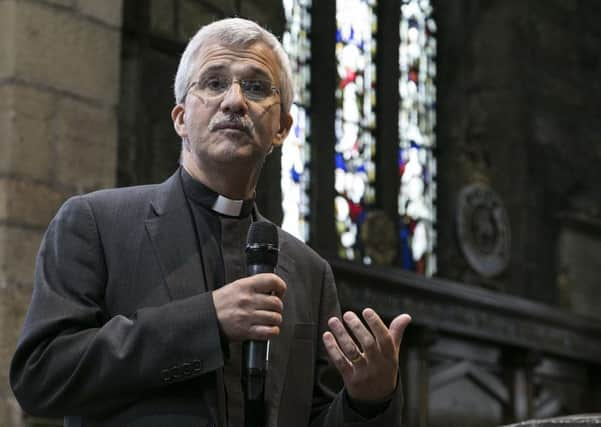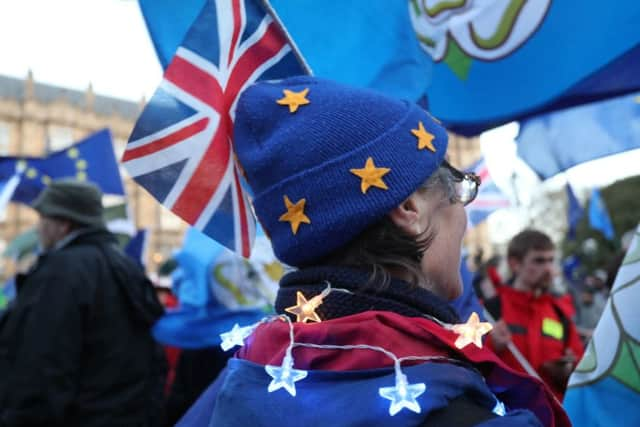Bishop of Huddersfield: We’re all Europeans and we can find unity through God at a time of Brexit divisions


They moved away from their home, like so many, in order to seek work and to start a new life. You could say perhaps that they were economic migrants. They always saw their identity as Welsh rather than English, though also naturally as British – and in a large part I see myself in the same way.
At school I had an interest in politics and philosophy, and I studied French. I went on to study philosophy and politics at the University of Oxford. I then worked in Paris at an Anglican Church for two years, among young people of many nationalities. My wife and I also met in Paris, and then lived in another very international city, when I trained at seminary in Cambridge.
Advertisement
Hide AdAdvertisement
Hide Ad

I served as a priest for three years in Manchester, before we moved to Switzerland, where I was priest of the Anglican Church in Basel, as well as priest of the Anglican Church in Freiburg-im-Breisgau and I first learned German. After six years, we returned to England, and lived for 17 years in a parish near Liverpool before I was made Bishop of Huddersfield in 2014.
I see myself as British, but not fully English, but I also see myself as European, at home to some extent in each of the three other nations in which I have lived and worked. I have lived outside my own culture, I have had to learn new languages, and when living in those countries, there have been times when I felt an outsider, in cultural and in political terms.
These things matter as we read and interpret the Bible, especially in the context of Europe today and in the context of Brexit. The challenge we are facing in Europe at the moment, including with Brexit, concerns in part the tension between our origins in a particular place, which is a crucial part of our identity, and our belonging together in a much larger entity, which we call Europe.
Advertisement
Hide AdAdvertisement
Hide AdMany British people wish to leave the European Union, because they feel that their identity and their living-space has been threatened by the arrival of too many people too quickly from other parts of the world, or of Europe itself. And similar feelings are being expressed in different ways by people in different nations across our continent, and it is leading to ugly scenes in many places.
As Christians, we, too, are rooted in particular places. We find much of our identity in the stories of where we were born and where we call home. There is nothing wrong with this. But on the other hand, we know, as Christians, that we have another identity, as followers of Jesus Christ. We know that we have another allegiance, which is to Jesus Christ as Lord.
And we know that we have a responsibility to live and to love others in the same kind of way that God has loved us in Jesus Christ.
However, it is not enough for us simply to proclaim “God so loved the world that he gave his only Son”. It is not enough for us to say to people “God loves you” – even though both of these things are certainly true. No, we have a responsibility both to challenge the deeds of darkness, to bring them to the light, and to demonstrate the love of Jesus Christ to the people of our generation. And that love is a love for the whole world, not just for the people who look like us and sound like us and who trace their origins back to the same “Heimatort” – or place of origin – as us.
Advertisement
Hide AdAdvertisement
Hide AdAs we approach March 29, the date of Brexit, we, as Christians, need to be speaking up for a better way of living, one that demonstrates the love of God for every single human being, both in Europe and throughout the world. We need to lift up Jesus Christ, not as a tribal symbol of a Christian sub-culture, but as the Lord and Saviour of the whole of humanity. We need to challenge the people of our generation, and especially our politicians, to come into the light, to leave behind the lies and the deeds of darkness, and to live in the light of the great truth which is at the heart of the Gospel: “God so loved the world that he gave his one and only Son…”
I am British (but not English), I am a European, but much more I am a human being and I am a follower of Jesus Christ – and because God so loved the world, whoever we are and wherever we find our earthly identity, as Christians we too must learn to love as he has loved us.
And whatever the future may bring after Brexit in political terms, as Christians we must work to ensure that God’s love for the world is reflected in all our relationships, and above all in the deepening of the relationships between our churches.
Now, more than ever, we must, as Christians, rededicate ourselves to the task of reconciliation between our churches and between our nations.
Advertisement
Hide AdAdvertisement
Hide AdThe Right Reverend Dr Jonathan Gibbs is the Bishop of Huddersfield. He preached in German on Sunday in the rebuilt Frauenkirche, Dresden, which was destroyed by Allied bombing and rebuilt after re-unification. This is an edited extract of his speech.